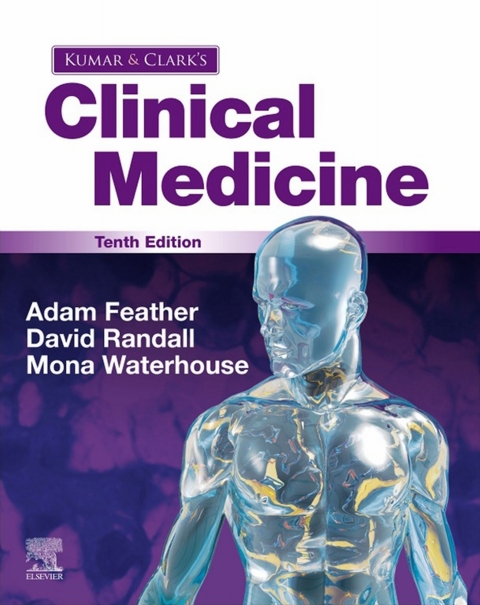Description
Efnisyfirlit
- Instructions for online access
- Cover image
- Title page
- Table of Contents
- Copyright
- Foreword to the Tenth Edition
- Preface to the Tenth Edition
- Online Clinical Overviews
- Online Special Topics
- Online Clinical Cases
- List of Contributors
- International Advisory Board
- Acknowledgements for the Tenth Edition
- 1. Diagnosis: The art of being a doctor
- Core Skills and Knowledge
- Diagnosis in the Clinical Consultation
- The medical consultation
- Clinical diagnostic reasoning
- Communicating a diagnosis
- Diagnosis, artificial intelligence and the future of medicine
- 2. Human genetics
- Core Skills and Knowledge
- Clinical skills for genetic medicine
- Introduction
- Clinical genetics
- The cellular basis of genetics
- Genetic disorders
- Techniques for studying the genetic code
- Genomic medicine
- The genetic basis of cancer
- 3. Immunity
- Core Skills and Knowledge
- Introducing the tissues, cells and molecules of the immune system
- Innate immune system
- Adaptive immune system
- Cell migration
- HLA molecules and antigen presentation
- The immune system in concert
- Laboratory investigations of the immune system
- Clinical immunodeficiency
- Allergic disease (immediate hypersensitivity)
- Autoimmune disease
- Organ rejection in clinical transplantation
- Immune-based therapies
- 4. Evidence-based practice
- Core Skills and Knowledge
- Introduction
- Asking Answerable Questions
- Searching for the Evidence
- Appraising the Evidence
- Applying the Evidence
- Section 1: Asking Answerable Questions and Searching for the Evidence
- Section 2: Critical Appraisal
- Section 3: Interpreting Odds Ratios, Confidence Intervals and P-Values
- Section 4: Multiple Choice Questions
- 5. Ethical practice and clinical communication
- Core Skills and Knowledge
- Ethics and the law
- Communication in medicine
- 6. Malignant disease
- Core Skills and Knowledge
- Clinical skills for malignant disease
- Introduction
- The biology of cancer
- Aetiology and epidemiology
- Screening and investigations
- Principles of cancer treatment
- Acute oncology
- Common solid tumour treatment
- Lung cancer
- Breast cancer
- Upper gastrointestinal cancers
- Lower gastrointestinal cancers
- Hepatobiliary and pancreatic cancers
- Urological cancers
- Gynaecological cancers
- Brain tumours
- Head and neck cancer
- Metastatic cancer of unknown primary
- 7. Palliative care and symptom control
- Core Skills and Knowledge
- Introduction and General Aspects
- Symptom Control
- Palliative Care in Non-Malignant Disease
- Care of the Dying
- 8. Sepsis and the treatment of bacterial infection
- Core Skills and Knowledge
- clinical skills for infection and sepsis
- Introduction
- Pathophysiology
- recognition of sepsis
- Management of Sepsis
- Antimicrobial Stewardship
- Antibiotic Therapies
- 9. Water balance, fluids and electrolytes
- Core skills and knowledge
- Clinical skills for water balance, fluids and electrolytes
- Water and Electrolytes
- Disorders of sodium concentration
- Disorders of potassium concentration
- Disorders of magnesium concentration
- Disorders of phosphate concentration
- Acid–Base Disorders
- 10. Critical care medicine
- Core Skills and Knowledge
- Introduction
- Clinical approach to the critically ill patient
- Applied cardiorespiratory physiology
- Disturbances of acid–base balance
- Shock, sepsis and acute disturbances of haemodynamic function
- Respiratory failure
- Acute respiratory distress syndrome
- Acute Kidney injury
- Neurocritical care
- Outcomes
- 11. Surgery
- Core Skills and Knowledge
- Clinical skills for surgery
- Introduction
- The pathophysiology of surgery
- Management of the perioperative patient
- The patient journey in surgery
- Surgical Ethics, Consent and the Law
- 12. Prescribing, therapeutics and toxicology
- Core Skills and Knowledge
- Prescribing
- Why do patients need drugs?
- The choice of drug
- The dose
- Prescribing in special populations
- Monitoring drug therapy
- Adverse drug reactions
- Drug interactions
- Information sources
- Poisoning
- Clinical approach to the poisoned patient
- Principles of management of poisoning
- Specific poisons
- Poisons in the natural world: additional online content
- 13. Global health
- Core Skills and Knowledge
- Introduction
- Millennium and Sustainable Development Goals
- Global Burden of Disease
- Poverty
- Water and Sanitation
- Organizations and the global health agenda
- Education
- Maternal and Child Health
- Mental health
- Accidents and Trauma
- Conflict and Catastrophe
- Economics and Politics in Global Health
- Social Determinants of Health
- Human rights and the value of engagement in global health
- 14. Public health
- Core Skills and Knowledge
- Introduction
- Key Concepts in Public Health
- Pillars of Public Health
- 15. Geriatric medicine, frailty and multimorbidity
- Core Skills and Knowledge
- Introduction
- Ageing
- Investigations in Older Adults
- Taking a History
- Multimorbidity, Sarcopenia and Frailty
- Comprehensive Geriatric Assessment
- Advance Care Planning
- The Most Common Issues in Older People
- Ageing Well and Advantages of Ageing
- 16. Haematology
- Core Skills and Knowledge
- Clinical skills for haematology
- Examination
- Investigations
- Introduction
- The red cell
- Anaemia: an introduction
- Microcytic anaemia
- Normocytic anaemia
- Macrocytic anaemias
- Anaemia due to marrow failure (aplastic anaemia)
- Haemolytic anaemias: an introduction
- Inherited haemolytic anaemia
- Acquired haemolytic anaemia
- Polycythaemia
- The spleen
- Blood transfusion
- Blood groups
- Procedure for blood transfusion in hospitals
- Complications of blood transfusion
- Strategies for the avoidance of unnecessary transfusion
- Blood, blood components and blood products
- The white cell
- Haemostasis
- Vascular disorders
- Platelet disorders
- Inherited coagulation disorders
- Acquired coagulation disorders
- 17. Haematological oncology
- Core Skills and Knowledge
- Clinical skills for haematological oncology
- Introduction
- Leukaemias
- Myelodysplasia
- Clinical features
- Investigations
- Management
- MDS/MPN overlap syndromes
- Lymphomas
- Myeloma and other plasma cell disorders
- 18. Rheumatology
- Core Skills and Knowledge
- Clinical skills for rheumatology
- Approach to the patient
- Anatomy and physiology of the normal joint
- Investigation of rheumatic disease
- Clinical conditions in rheumatology
- Common regional musculoskeletal problems
- Chronic pain syndromes
- Analgesic and anti-inflammatory drugs for musculoskeletal problems
- Disorders of collagen
- Osteoarthritis
- Inflammatory Arthritis
- Rheumatoid arthritis
- Spondyloarthritis
- Infections of joints
- Autoimmune rheumatic diseases
- Systemic inflammatory vasculitis
- Arthritis in children
- Rheumatological problems seen in other diseases
- Miscellaneous arthropathies
- 19. Bone disease
- Core Skills and Knowledge
- Clinical skills for bone disease
- Anatomy and physiology of bone
- Investigation of bone and calcium disorders
- Osteoporosis
- Osteonecrosis
- Paget’s disease of bone
- Rickets and osteomalacia
- Bone infections
- Neoplastic disease of bone
- Scheuermann’s disease
- 20. Infectious disease
- Core Skills and Knowledge
- Core content
- Clinical skills for infectious disease
- Introduction
- Clinical approach to the patient with a suspected infection
- Epidemiology and prevention of infections
- Principles and mechanisms of infection
- Viral Infections
- Virus infections of the skin and mucous membranes
- Virus infections of the respiratory tract
- Systemic viral infections
- Virus infections of the nervous system
- Virus infections of the gastrointestinal tract
- Viral hepatitis
- Viruses and malignant disease
- Viral haemorrhagic fevers
- Antiviral drugs
- Transmissible Spongiform Encephalopathies (Prion Diseases)
- Bacterial Infections
- Bacterial infections of the skin and soft tissues
- Bacterial infections of the respiratory tract
- Bacterial infections of the gastrointestinal tract
- Bacterial infections of the cardiovascular system
- Bacterial infections of the nervous system
- Bacterial bone and joint infections
- Bacterial infections of the urinary tract
- Systemic/multisystem bacterial infections
- Bacterial infections seen in developing and tropical countries
- Antibiotic therapies
- Fungal Infections
- Systemic fungal infections
- Subcutaneous fungal infections
- Superficial fungal infections
- Antifungal drugs
- Protozoal Infections
- Blood and tissue protozoa
- Gastrointestinal protozoa
- Helminthic Infections
- Nematodes
- Trematodes
- Cestodes
- Arthropod Ectoparasites
- 21. Endocrinology
- Core Skills and Knowledge
- Clinical skills for endocrinology
- Introduction
- The pituitary gland and hypothalamus
- Hypothalamo–Pituitary–adrenal axis
- The thyroid axis
- Hypothalamo–pituitary–gonadal axis
- Growth and puberty
- The Thirst Axis
- Disorders of Calcium Metabolism
- Hypoglycaemia in the non-diabetic patient
- Other endocrine disorders
- 22. Dermatology
- Core Skills and Knowledge
- Clinical Skills for Dermatology
- Introduction
- Skin structure and function
- Investigation of Skin Disease
- Principles of Dermatological Therapy
- Erythroderma and Loss of Skin Function (‘Skin Failure’)
- Common rashes
- Skin Infections
- Human Immunodeficiency Virus and the Skin
- Skin Signs of Systemic Disease
- Photosensitivity
- Blistering and Bullous Skin Disease
- Skin Tumours
- Disorders of Pigmentation
- Nail Disorders
- Hair Disorders
- Birth Marks and Neonatal Rashes
- Drug Eruptions
- 23. Diabetes mellitus
- Core Skills and Knowledge
- Clinical skills for diabetes mellitus
- Introduction
- Physiology of insulin structure, secretion and action
- Classification of diabetes
- Clinical Approach to the Patient With Diabetes
- Prevention of Type 2 Diabetes
- Management of diabetes
- Diabetic metabolic emergencies
- Complications of diabetes
- Psychosocial Implications of Diabetes
- Diabetes in special situations
- Organization of diabetes care
- 24. Lipid and metabolic disorders
- Core Skills and Knowledge
- Introduction
- History
- Examination
- Investigations
- Disorders of lipid metabolism
- Inherited metabolic diseases
- 25. Liaison psychiatry
- Core Skills and Knowledge
- Introduction
- Clinical approach to the patient with a psychiatric disorder
- Classification of psychiatric disorders
- Aetiology of psychiatric disorders
- Psychiatric aspects of physical diseases
- Sick role and illness behaviour
- Functional somatic syndromes
- Somatoform disorders
- Dissociative/conversion disorders
- Sleep difficulties
- Mood (affective) disorders
- Suicide and self-harm
- Anxiety disorders
- Alcohol misuse and dependence
- Drug misuse and dependence
- Schizophrenia
- Organic mental disorders
- Eating disorders
- Sexual disorders
- Personality disorders
- Involuntary Detention
- Mental Capacity Act
- 26. Neurology
- Core Skills and Knowledge
- Clinical skills for neurology
- Introduction
- Clinical approach to the patient with neurological disease
- Functional neuroanatomy
- Cranial nerves
- Motor control systems
- Lower motor neurone lesions
- Sensory pathways and pain
- Bladder control and sexual dysfunction
- Investigation of neurological disease
- Unconsciousness and coma
- Stroke
- Intracranial haemorrhage
- Headache, migraine and facial pain
- Epilepsy and loss of consciousness
- Movement disorders
- Neuroinflammatory disorders
- Nervous system infection
- Hydrocephalus
- Traumatic brain injury
- Spinal cord disease
- Neurodegenerative diseases
- Congenital disorders
- Neurogenetic disorders
- Paraneoplastic syndromes
- Peripheral nerve disease
- Muscle diseases
- 27. Ear, nose and throat and eye disease
- Core Skills and Knowledge
- Introduction to ENT
- Clinical approach to the patient with an ENT complaint
- Disorders of the Ear
- Clinical Approach to the Patient With a Disorder of the Ear
- Common disorders of the ear
- Disorders of the Nose
- Clinical Approach to the Patient With a Disorder of the Nose
- Common disorders of the nose
- Disorders of the Throat
- Clinical Approach to the Patient With a Disorder of the Throat
- Common disorders of the throat
- Disorders of the Eye
- Applied Anatomy and Physiology
- Clinical Approach to the Patient With a Disorder of the Eye
- Common disorders of the eye
- 28. Respiratory disease
- Core Skills and Knowledge
- Clinical skills for respiratory medicine
- Function of the respiratory system
- Clinical Approach to the Patient with Respiratory Disease
- Diseases of the Upper Respiratory Tract
- Obstructive Respiratory Disease
- Smoking
- Respiratory Infection
- Pleural Disease
- Tumours of the Respiratory Tract
- Bronchiectasis
- Interstitial Lung Diseases
- Lung and Heart–Lung Transplantation
- Occupational Lung Disease
- Miscellaneous Respiratory Disorders
- Disorders of the Diaphragm
- Mediastinal Lesions
- 29. Venous thromboembolic disease
- Core Skills and Knowledge
- Introduction
- Pathogenesis of Thrombosis
- Definitions
- Epidemiology and Risk Factors
- Clinical Features
- Diagnosis
- Management
- Complications
- Investigation of newly diagnosed venous thrombosis
- Prevention
- Anticoagulant agents
- 30. Cardiology
- Core Skills and Knowledge
- Clinical skills for cardiology
- ECG interpretation
- Anatomy, physiology and embryology of the heart
- Clinical approach to the patient with heart disease
- Therapeutic procedures
- Cardiac arrhythmias
- Bradycardias and heart block
- Supraventricular tachycardias
- Ventricular tachyarrhythmias
- Heart failure
- Coronary artery disease
- Angina
- Acute coronary syndromes
- Valvular heart disease
- Aortic valve
- tricuspid valve
- Pulmonary valve
- Prosthetic valves
- Infective endocarditis
- Congenital heart disease
- Marfan’s syndrome
- Pulmonary heart disease
- Myocardial and endocardial disease
- Myocardial disease
- Pericardial disease
- Peripheral vascular disease
- Peripheral venous disease
- 31. Hypertension
- Core Skills and Knowledge
- Introduction
- Clinical Approach to the Patient with Hypertension
- Measurement of blood pressure
- Phenotypes of Hypertension
- Causes of raised blood pressure
- Thresholds and Targets In Hypertension
- Hypertensive Target Organ Damage
- Treatment
- Managing blood pressure in hospital
- 32. Gastroenterology
- Core Skills and Knowledge
- Clinical Skills for Gastroenterology
- INTRODUCTION
- Anatomy and physiology of the gastrointestinal tract
- Investigation of Gastrointestinal Disease
- Functional Gastrointestinal Disorders
- Mouth
- Salivary Glands
- Pharynx and Oesophagus
- Stomach and Duodenum
- Acute and Chronic Gastrointestinal Bleeding
- Small Intestine
- Inflammatory Bowel Disease
- Colon and Rectum
- The Acute Abdomen
- Peritoneum
- 33. Nutrition
- Core Skills and Knowledge
- Introduction
- Water and Electrolyte Balance
- Dietary Requirements
- Protein–Energy Malnutrition
- Vitamins
- Fat-soluble vitamins
- Water-soluble vitamins
- Dietary Antioxidants
- Homocysteine, cardiovascular disease and B vitamins
- Minerals
- Nutrition and Ageing
- Obesity
- Nutritional Support
- Food Allergy and Food Intolerance
- Alcohol
- 34. Liver disease
- Core Skills and Knowledge
- Clinical skills for liver disease
- Introduction
- Anatomy of the liver and biliary system
- Functions of the liver
- Investigations in the patient with liver disease
- Jaundice
- Hepatitis
- Acute hepatic failure
- Autoimmune hepatitis
- Drug-induced chronic hepatitis
- Chronic hepatitis of unknown cause
- Non-alcoholic fatty liver disease
- Cirrhosis
- Alcoholic liver disease
- Budd–chiari syndrome
- Hepatic sinusoidal obstruction syndrome
- Fibropolycystic diseases
- Liver abscess
- Other infections of the liver
- Liver disease in pregnancy
- Liver tumours
- Miscellaneous conditions of the liver
- Drugs and the liver
- 35. Biliary tract and pancreatic disease
- Core Skills and Knowledge
- Introduction
- Gall Bladder and Biliary System
- Biliary system
- Miscellaneous conditions of the biliary tract
- Pancreas
- Pancreatitis
- Pancreatic cancer
- Pancreatic neuroendocrine tumours
- Clinical syndromes
- Investigations
- Management
- 36. Kidney and urinary tract disease
- Core Skills and Knowledge
- Clinical Skills for Nephrology
- Examination
- Introduction
- Anatomy and Physiology of the Kidney and Urinary Tract
- Investigation of Renal and Urinary Tract Disease
- The Glomerulus and Glomerular Disease
- Kidney Involvement in Other Diseases
- Hypertension and the Kidney
- Other Vascular Disorders of the Kidney
- Renal Calculi and Nephrocalcinosis
- Urinary Tract Obstruction
- Drugs and the Kidney
- Urinary Tract Infection
- Tubulointerstitial Nephritis
- Acute Kidney Injury
- Chronic Kidney Disease
- Cystic Renal Disease
- Tumours of the Kidney and Genitourinary Tract
- Diseases of the Prostate Gland
- The Urinary Tract in the Elderly
- 37. Sexually transmitted infections and human immunodeficiency virus
- Core Skills and Knowledge
- Clinical skills for STI and HIV care
- Sexually transmitted infections
- Asymptomatic STI screening
- Investigation of STIs
- Management, prevention and control
- Specific infections
- Human immunodeficiency virus and acquired immunodeficiency syndrome
- Clinical features of untreated hiv infection
- Clinical approach to the patient with HIV
- Management of HIV-positive patients
- Specific conditions associated with HIV infection
- Prevention and control of HIV infection
- 38. Obstetric medicine
- Core Skills and Knowledge
- Clinical Skills for Obstetric Medicine
- Introduction
- Hypertensive Disorders
- Liver Disease
- Cardiac Disease
- Thromboembolic Disease
- Respiratory Disease
- Neurological Disease
- Endocrine Disease
- Renal Disease
- Skin Disorders
- RHEUMATIC DISEASE
- Prescribing in Pregnancy
- 39. Women’s health
- Core Skills and Knowledge
- Clinical skills for women’s health
- Introduction
- The life course approach
- Miscarriage
- Heavy Menstrual Bleeding
- Abortion/Termination of Pregnancy
- Urinary Incontinence
- Domestic abuse and violence
- Gynaecological cancers
- 40. Men’s health
- Core Skills and Knowledge
- Clinical Skills For Men’s Health
- Introduction
- Specific Diseases of Men
- Diseases of the prostate gland
- Diseases of the Penis
- Testicular and Spermatic Cord Disease
- Lack of Libido and Erectile Dysfunction
- Priapism
- The Ageing Male
- 41. Environmental medicine
- Core Skills and Knowledge
- Air pollution
- Heat Injury
- Cold injury
- High altitude
- Diving
- Drowning
- Ionizing radiation
- Electric shock
- Lightning strike
- Inhaled smoke
- Index
- Normal Values





